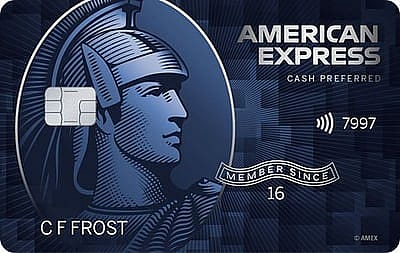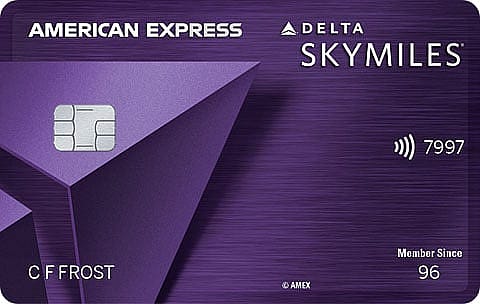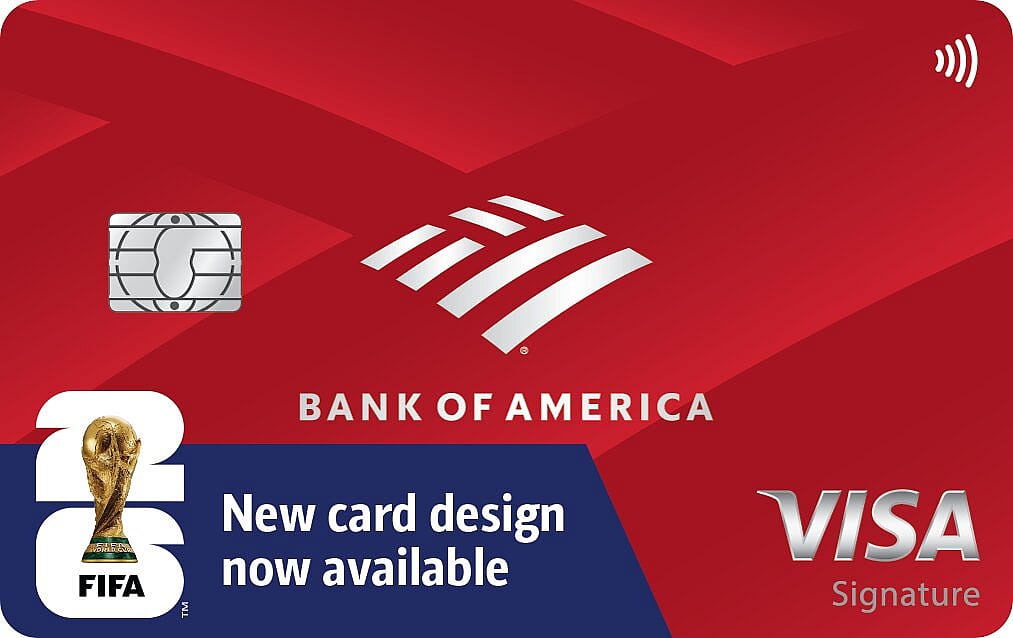Best Credit Cards for Couples of March 2026
Many or all of the products on this page are from partners who compensate us when you click to or take an action on their website, but this does not influence our evaluations or ratings. Our opinions are our own.
Many or all of the products on this page are from partners who compensate us when you click to or take an action on their website, but this does not influence our evaluations or ratings. Our opinions are our own.
Whether couples share finances or keep them separate, some credit cards are ideal for twosomes — those who like to travel together, just stay home or anything in between. Most popular credit cards don’t offer joint accounts anymore. (More on that below.) But couples can use a two-player strategy with their cards by making each other authorized users.
2026 Best credit card for groceries
Apply Nowon American Express' websiteon American Express' websiteAnnual fee$0 intro annual fee for the first year, then $95.Rewards rate1%-6%CashbackIntro offerAs High as $300 cash back. Find Out Your Offer.Recommended creditPurchase intro APR0% intro APR on purchases for 12 months from the date of account openingBalance transfer intro APR0% intro APR on balance transfers for 12 months from the date of account openingAPR19.49%-28.49% Variable APRRewards breakdown
6%Cash Back at U.S. supermarkets on up to $6,000 per year in purchases (then 1%).6%Cash Back on select U.S. streaming subscriptions.3%Cash Back at U.S. gas stations and on transit (including taxis/rideshare, parking, tolls, trains, buses and more).1%Cash Back on other purchases.Card details
- Apply and find out your welcome offer. As High As $300 cash back* after you spend $3,000 in purchases on your new Card within the first 6 months of Card Membership. Welcome offers vary and you may not be eligible for an offer. Apply, and if approved: 1. Find out your offer amount 2. Accept the Card with your offer 3. Spend $3,000 in 6 months 4. Receive the cash back. *Cash back is received in the form of Reward Dollars that can be redeemed for a statement credit or at Amazon.com checkout.
- $0 intro annual fee for the first year, then $95.
- Enjoy 0% intro APR on purchases and balance transfers for 12 months from the date of account opening. After that, your APR will be a variable APR of 19.49%-28.49%.
- Plan It®: Buy now, pay later with Plan It. Split purchases of $100 or more into equal monthly installments with a fixed fee so you don’t have the pressure of paying all at once. Simply select the purchase in your online account or the American Express® App to see your plan options. Plus, you’ll still earn rewards on purchases the way you usually do.
- Earn 6% cash back at U.S. supermarkets on up to $6,000 per year in eligible purchases (then 1%), 6% cash back on select U.S. streaming subscriptions, 3% cash back at eligible U.S. gas stations and on transit (including taxis/rideshare, parking, tolls, trains, buses and more) purchases and 1% cash back on other purchases. Cash Back is received in the form of Reward Dollars that can be redeemed as a statement credit and at Amazon.com checkout.
- Get up to a $10 monthly statement credit after using your enrolled Blue Cash Preferred® Card for a subscription purchase, including a bundle subscription purchase, at DisneyPlus.com, Hulu.com, or Stream.ESPN.com U.S. websites. Subject to auto-renewal.
- Terms Apply.
- View Rates & Fees
NerdWallet's take
If you’re more the stay-at-home type of couple than you are jet-setters, the Blue Cash Preferred® Card from American Express packs plenty of value with industry-leading rewards at U.S. supermarkets and on U.S. streaming subscriptions. (Make sure to set it as your default payment method for streaming services.).
Read full reviewProsRewards: 6% cash back at U.S. supermarkets, on up to $6,000 a year in spending (then 1%); 6% cash back on select U.S. streaming subscriptions; 3% cash back at U.S. gas stations and on transit (including such things as taxis, rideshares, parking, tolls, trains and buses); and 1% cash back on all other purchases. Terms apply.
Welcome offer: You may be eligible for as high as $300 cash back after spending $3,000 in purchases on your new Card in the first 6 months. Welcome offers vary and you may not be eligible for an offer. Cash back is received as Reward Dollars, redeemable for statement credit or at Amazon.com checkout. Terms Apply..
Introductory APR promotion on purchases and balance transfers.
Terms apply.
ConsUnlike with most cards on this list, there's an annual fee: $0 intro annual fee for the first year, then $95. You can easily make it back, however, with regular spending in the bonus categories.
Terms apply.
Our pick for: Travel companion benefits
Apply Nowon American Express' websiteon American Express' websiteAnnual fee$650Rewards rate1x-3xMilesIntro offerUp to 125,000 MilesAPR19.49%-28.49% Variable APRRecommended creditRewards breakdown
3xMiles on Delta purchases.1xMile on all other eligible purchases.Card details
- Earn 100,000 Bonus Miles after you spend $6,000 or more in purchases with your new Card within the first 6 months of Card Membership and an additional 25,000 bonus miles after you make an additional $3,000 in purchases on the Card within your first 6 months, starting from the date that your account is opened. Offer Ends 04/01/2026.
- Delta SkyMiles® Reserve American Express Card Members receive 15 Visits per Medallion® Year to the Delta Sky Club® when flying Delta and can unlock an unlimited number of Visits after spending $75,000 in purchases on your Card in a calendar year. Plus, you’ll receive four One-Time Guest Passes each Medallion Year so you can share the experience with family and friends when traveling Delta together.
- Enjoy complimentary access to The Centurion® Lounge in the U.S. and select international locations (as set forth on the Centurion Lounge Website), Sidecar by The Centurion® Lounge in the U.S. (see the Centurion Lounge Website for more information on Sidecar by The Centurion® Lounge availability), and Escape Lounges when flying on a Delta flight booked with the Delta SkyMiles® Reserve American Express Card. § To access Sidecar by The Centurion® Lounge, Card Members must arrive within 90 minutes of their departing flight (including layovers). To access The Centurion® Lounge, Card Members must arrive within 3 hours of their departing flight. Effective July 8, 2026, during a layover, Card Members must arrive within 5 hours of the connecting flight.
- Receive $2,500 Medallion® Qualification Dollars with MQD Headstart each Medallion Qualification Year and earn $1 MQD for each $10 in purchases on your Delta SkyMiles® Reserve American Express Card with MQD Boost to get closer to Status next Medallion Year.
- Enjoy a Companion Certificate on a Delta First, Delta Comfort, or Delta Main round-trip flight to select destinations each year after renewal of your Card. The Companion Certificate requires payment of government-imposed taxes and fees of between $22 and $250 (for itineraries with up to four flight segments). Baggage charges and other restrictions apply. Delta Basic experiences are not eligible for this benefit.
- $240 Resy Credit: When you use your Delta SkyMiles® Reserve American Express Card for eligible purchases with U.S. Resy restaurants, you can earn up to $20 each month in statement credits. Enrollment required.
- $120 Rideshare Credit: Earn up to $10 back in statement credits each month after you use your Delta SkyMiles® Reserve American Express Card to pay for U.S. rideshare purchases with select providers. Enrollment required.
- Delta SkyMiles® Reserve American Express Card Members get 15% off when using miles to book Award Travel on Delta flights through delta.com and the Fly Delta app. Discount not applicable to partner-operated flights or to taxes and fees.
- With your Delta SkyMiles® Reserve American Express Card, receive upgrade priority over others with the same Medallion tier, product and fare experience purchased, and Million Miler milestone when you fly with Delta.
- Earn 3X Miles on Delta purchases and earn 1X Miles on all other eligible purchases.
- No Foreign Transaction Fees. Enjoy international travel without additional fees on purchases made abroad.
- $650 Annual Fee.
- Apply with confidence. Know if you're approved for a Card with no impact to your credit score. If you're approved and you choose to accept this Card, your credit score may be impacted.
- Terms Apply.
- View Rates & Fees
NerdWallet's take
Being a couple means you often have a travel companion, and it helps to have a travel card with perks that apply to more than just the primary cardholder. Three of the most coveted airline-related perks are free checked bags, a companion fare and airport lounge access. The Delta SkyMiles® Reserve American Express Card has all three. Terms apply.
Read full reviewProsRewards: 3X miles spent with Delta Air Lines; 1X miles on other spending. Terms apply.
Welcome offer: Earn 100,000 Bonus Miles after you spend $6,000 in purchases with your new Card, and an additional 25,000 bonus miles after you make an additional $3,000 in purchases on the Card, both within your first 6 months. Ends 04/01/2026. Terms Apply..
Access to Delta Sky Clubs (up to 15 complimentary visits annually, or an unlimited amount of visits if you spend $75,000 or more with the card in a calendar year) and American Express Centurion Lounges.
You’ll get an annual companion certificate upon renewal that's good even in first class.
A free checked bag for up to nine people on a reservation.
Reimbursement for the application fee for TSA PreCheck or Global Entry.
Terms apply.
ConsAll those perks don't come cheap. The annual fee is $650. That's still less than the cost of a stand-alone Delta lounge membership, however.
No introductory APR offer.
Terms apply.
2026 Best credit card for dining
Apply Nowon Capital One's websiteon Capital One's websiteAnnual fee$0Rewards rate1%-8%CashbackIntro offer$200Recommended credit scorePurchase intro APR0% intro on purchases for 12 monthsBalance transfer intro APR0% intro on balance transfers for 12 months; balance transfer fee appliesRegular APR18.49%-28.49% Variable APRRewards breakdown
8%Cash back on Capital One Entertainment purchases.5%Cash back on hotels, vacation rentals and rental cars booked through Capital One Travel.3%Cash back on dining.3%Cash back on entertainment.3%Cash back on popular streaming services.3%Cash back at grocery stores (excluding superstores like Walmart® and Target®).1%Cash back on all other purchases.Card details
- Earn a one-time $200 cash bonus once you spend $500 on purchases within the first 3 months from account opening
- $0 annual fee and no foreign transaction fees
- Earn unlimited 3% cash back at grocery stores (excluding superstores like Walmart® and Target®), on dining, entertainment and popular streaming services, plus 1% on all other purchases
- Earn 8% cash back on Capital One Entertainment purchases
- Earn unlimited 5% cash back on hotels, vacation rentals and rental cars booked through Capital One Travel
- No rotating categories or sign-ups needed to earn cash rewards; plus cash back won't expire for the life of the account and there's no limit to how much you can earn
- 0% intro APR on purchases and balance transfers for 12 months; 18.49% - 28.49% variable APR after that; balance transfer fee applies
- Top rated mobile app
- View Rates & Fees
NerdWallet's take
If going out is what gets you and your partner fired up, the Capital One Savor Cash Rewards Credit Card is the perfect third wheel. For a $0 annual fee, it offers superb cash-back rewards on dining and entertainment. And if you like to entertain at home, it also earns well at grocery stores and on streaming.
Read full reviewProsRewards: 3% cash back at grocery stores, on select streaming subscriptions and on entertainment (which includes movies, plays, concerts, sporting events, tourist attractions, theme parks, aquariums, zoos, dance clubs and more); 8% cash back on Capital One Entertainment purchases; 5% cash back on hotels, vacation rentals and rental cars booked through Capital One Travel; 1% cash back on all other purchases.
Welcome offer: Earn a one-time $200 cash bonus once you spend $500 on purchases within the first 3 months from account opening..
Introductory APR promotion on purchases and balance transfers.
ConsOur pick for: Parents
Apply Nowon Chase's websiteon Chase's websiteAnnual fee$0Rewards rate1%-5%CashbackIntro offer$200Recommended credit scorePurchase intro APR0% intro APR on purchases for 15 monthsBalance transfer intro APR0% intro APR on balance transfers for 15 monthsRegular APR18.24%-27.74% Variable APRRewards breakdown
5%Cash back on up to $1,500 in combined purchases in bonus categories each quarter you activate.5%Cash back on travel purchased through Chase Travel℠.3%Cash back on dining.3%Cash back at drugstores.1%Cash back on all other purchases.Card details
- Earn a $200 Bonus after you spend $500 on purchases in your first 3 months from account opening
- 5% cash back on up to $1,500 in combined purchases in bonus categories each quarter you activate. Enjoy new 5% categories each quarter!
- 5% cash back on travel purchased through Chase Travel℠, our premier rewards program that lets you redeem rewards for cash back, travel, gift cards and more
- 3% cash back on drugstore purchases and dining at restaurants, including takeout and eligible delivery service, and unlimited 1% cash back on all other purchases.
- No minimum to redeem for cash back. You can use points to redeem for cash through an account statement credit or an electronic deposit into an eligible Chase account located in the United States.
- 0% Intro APR for 15 months from account opening on purchases and balance transfers, then a variable APR of 18.24% - 27.74%.
- No annual fee – You won't have to pay an annual fee for all the great features that come with your Freedom Flex® card
- Keep tabs on your credit health - Chase Credit Journey helps you monitor your credit with free access to your latest score, real-time alerts, and more.
- Member FDIC
- View Rates & Fees
NerdWallet's take
The bonus structure on the Chase Freedom Flex® requires a little work, but the card has a slew of useful categories that can help couples rack up points quickly when they’re spending enough to keep a household running. Tag team with your partner to use this $0-annual-fee card for its bonus categories.
Read full reviewProsRewards: 5% cash back on up to $1,500 in spending per quarter in quarterly categories that you activate (see current categories below); 5% back on travel booked through Chase; 3% back on dining, including takeout and delivery services; 3% back at drugstores; and 1% back on all other purchases.
Welcome offer: Earn a $200 Bonus after you spend $500 on purchases in your first 3 months from account opening..
Introductory APR promotion for purchases and balance transfers.
Cons2026 Best all-purpose travel rewards credit card
Apply Nowon Chase's websiteon Chase's websiteAnnual fee$95Rewards rate1x-5xPointsIntro offer75,000pointsRegular APR19.24%-27.49% Variable APRRecommended credit scoreRewards breakdown
5xPoints on travel purchased through Chase Travel℠.3xPoints on dining.3xPoints on select streaming services.3xPoints on online groceries.2xPoints on all other travel purchases.1xPoint on all other purchases.Card details
- Earn 75,000 bonus points after you spend $5,000 on purchases in the first 3 months from account opening.
- Enjoy benefits such as 5x on travel purchased through Chase Travel℠, 3x on dining, select streaming services and online groceries, 2x on all other travel purchases, 1x on all other purchases
- Earn up to $50 in statement credits each account anniversary year for hotel stays through Chase Travel℠
- 10% anniversary points boost - each account anniversary you'll earn bonus points equal to 10% of your total purchases made the previous year.
- Count on Trip Cancellation/Interruption Insurance, Auto Rental Collision Damage Waiver, Lost Luggage Insurance and more.
- Complimentary DashPass which unlocks $0 delivery fees & lower service fees for a min. of one year when you activate by 12/31/27. Plus, a $10 promo each month on non-restaurant orders.
- Member FDIC
- View Rates & Fees
NerdWallet's take
If you’re a couple defined by your wanderlust or are newlyweds who have a honeymoon to plan, the Chase Sapphire Preferred® Card will be your jam. Good rewards and flexible points make it a relative bargain.
Read full reviewProsRewards: 5X points on all travel booked through Chase; 3X points on dining, select streaming services, and online grocery purchases (not including Target, Walmart and wholesale clubs); 2X points on travel not purchased through Chase; and 1X points on other purchases.
Welcome offer: Earn 75,000 bonus points after you spend $5,000 on purchases in the first 3 months from account opening..
Points can be used to book travel via Chase, or you can transfer them to about a dozen airline or hotel partners, including United, Southwest and Marriott.
Benefits each account anniversary year include up to $50 in statement credits for hotel stays booked through Chase, and bonus points equal to 10% of your total purchases made the previous year.
Travel protections, including coverage for lost baggage and trip cancellation.
Complimentary DashPass membership.
ConsThere's a $95 annual fee. That's on par with other cards in its class, but some consumers draw the line at paying an annual fee on a credit card.
No introductory APR offer.
Our pick for: Home improvement
Apply Nowon Bank of America's websiteon Bank of America's websiteAnnual fee$0Rewards rate1%-6%CashbackIntro offer$200Recommended credit scorePurchase intro APR0% intro APR on Purchases for 15 billing cyclesBalance transfer intro APR0% intro APR on Balance Transfers for 15 billing cycles for any balance transfers made in the first 60 daysRegular APR17.49%-27.49% Variable APRRewards breakdown
6%Cash back for the first year in the category of your choice (up to $2,500 in combined choice category/grocery store/wholesale club quarterly purchases).3%Cash back in the category of your choice after the first year (up to $2,500 in combined choice category/grocery store/wholesale club quarterly purchases).2%Cash back at grocery stores and wholesale clubs (up to $2,500 in combined choice category/grocery store/wholesale club quarterly purchases).1%Cash back on all other purchases.Card details
- $200 online cash rewards bonus after you make at least $1,000 in purchases in the first 90 days of account opening.
- Earn 6% cash back for the first year in the category of your choice. You’ll automatically earn 2% cash back at grocery stores and wholesale clubs, and unlimited 1% cash back on all other purchases. After the first year from account opening, you’ll earn 3% cash back on purchases in your choice category.
- Earn 6% and 2% cash back on the first $2,500 in combined purchases each quarter in the choice category, and at grocery stores and wholesale clubs, then earn unlimited 1% thereafter. After the 3% first-year bonus offer ends, you will earn 3% and 2% cash back on these purchases up to the quarterly maximum.
- No annual fee and cash rewards don’t expire as long as your account remains open.
- Select your card design option when you apply – the Customized Cash Rewards design, or the limited-time FIFA World Cup 2026™ design.
- 0% Intro APR for 15 billing cycles for purchases, and for any balance transfers made in the first 60 days. After the Intro APR offer ends, a Variable APR that’s currently 17.49% - 27.49% will apply. A 3% Intro balance transfer fee will apply for the first 60 days your account is open. After the Intro balance transfer fee offer ends, the fee for future balance transfers is 5%. Balance transfers may not be used to pay any account provided by Bank of America.
- This offer may not be available elsewhere if you leave this page. You can take advantage of this offer when you apply now.
NerdWallet's take
If you’re homeowners making repairs or upgrades — or if you're renters trying to furnish an apartment — you might as well get rewarded for your pricey improvements. The combination of benefits on the $0-annual-fee Bank of America® Customized Cash Rewards credit card, including its 3% cash back options, makes it ideal for home spending.
Read full reviewProsRewards: 3% cash back in a category you choose from a list of six (one option is “home improvement and furnishings”) and 2% back at grocery stores and wholesale clubs, on up to $2,500 in combined spending per quarter in these categories; and 1% back on everything else.
For the first year, earn up to 6% cash back in your chosen category. Terms apply.
Welcome offer: $200 online cash rewards bonus after you make at least $1,000 in purchases in the first 90 days of account opening..
Introductory APR promotion on purchases and balance transfers.
Bank of America® Preferred Rewards members can earn 25%-75% more cash back.
ConsThe rewards structure is somewhat complicated.
The amount of spending eligible for the 3% rewards is capped, so on bigger projects you might earn a greater return on a card with unlimited 1.5% or 2% cash back.
The ability to earn 6% back in certain categories is limited to the first year and subject to the same quarterly spending cap that applies to the card’s normal bonus rates.
Our pick for: Tackling debt
Apply Nowon Wells Fargo's websiteon Wells Fargo's websiteAnnual fee$0Rewards rateN/AIntro offerN/ARecommended credit scorePurchase intro APR0% intro APR for 21 months from account opening on purchasesBalance transfer intro APR0% intro APR for 21 months from account opening on qualifying balance transfersRegular APR17.49%, 23.99%, or 28.24% Variable APRCard details
- Apply Now to take advantage of this offer and learn more about product features, terms and conditions.
- 0% intro APR for 21 months from account opening on purchases and qualifying balance transfers. 17.49%, 23.99%, or 28.24% variable APR thereafter; balance transfers made within 120 days qualify for the intro rate, BT fee of 5%, min: $5.
- $0 annual fee.
- Up to $600 of cell phone protection against damage or theft. Subject to a $25 deductible.
- Through My Wells Fargo Deals, you can get access to personalized deals from a variety of merchants. It's an easy way to earn cash back as an account credit when you shop, dine, or enjoy an experience simply by using an eligible Wells Fargo credit card.
- View Rates & Fees
NerdWallet's take
Getting out of debt might not be the most romantic project you’ll tackle as a couple, but it could be among the most important. To get a break from punishing interest charges, you could transfer balances to the Wells Fargo Reflect® Card. You’ll enjoy a super-long 0% intro APR period as long as you pay on time, and a $0 annual fee.
Read full reviewProsYou get a 0% intro APR for 21 months from account opening on purchases and qualifying balance transfers, and then the ongoing APR of 17.49%, 23.99%, or 28.24% Variable APR.
Cell phone protection.
Cons2026 Best all-purpose cash back credit card
Apply Nowon Wells Fargo's websiteon Wells Fargo's websiteAnnual fee$0Rewards rate2%CashbackIntro offer$200Recommended credit scorePurchase intro APR0% intro APR for 12 months from account opening on purchasesBalance transfer intro APR0% intro APR for 12 months from account opening on qualifying balance transfersRegular APR18.49%, 24.49%, or 28.49% Variable APRRewards breakdown
2%Unlimited Cash rewards on purchases.Card details
- Apply Now to take advantage of this offer and learn more about product features, terms and conditions.
- Earn a $200 cash rewards bonus after spending $500 in purchases in the first 3 months.
- Earn unlimited 2% cash rewards on purchases.
- 0% intro APR for 12 months from account opening on purchases and qualifying balance transfers. 18.49%, 24.49%, or 28.49% variable APR thereafter; balance transfers made within 120 days qualify for the intro rate and fee of 3% then a BT fee of up to 5%, min: $5.
- $0 annual fee.
- No categories to track or remember and cash rewards don’t expire as long as your account remains open.
- Find tickets to top sports and entertainment events, book travel, make dinner reservations and more with your complimentary 24/7 Visa Signature® Concierge.
- Up to $600 of cell phone protection against damage or theft. Subject to a $25 deductible.
- View Rates & Fees
NerdWallet's take
Every couple needs a no-hassle card that gives good rewards regardless of spending category. The $0-annual-fee Wells Fargo Active Cash® Card pays a great rate on every eligible purchase and adds a nice welcome offer and intro APR period. It's a perfect “everything else” card, when you can’t get better rewards from a different card.
Read full reviewProsRewards: 2% cash back on all eligible purchases.
Welcome offer: Earn a $200 cash rewards bonus after spending $500 in purchases in the first 3 months..
Introductory APR promotion for purchases and balance transfers.
Cell phone protection.
Cons
More about our picks
Wells Fargo Active Cash® Card
Our pick for: Everyday spending
Among flat-rate cash-back cards, you'll be hard-pressed to beat the Wells Fargo Active Cash® Card. It earns an unlimited 2% back on all purchases, which is excellent. But in addition, the card offers a rich sign-up bonus and a decent intro APR period on both purchases and balance transfers. That's an impressive, hard-to-find combination of features on a card with a $0 annual fee. Read our review.
Blue Cash Preferred® Card from American Express
Our pick for: Homebodies
If your household spends a lot on groceries, gas, transit and streaming, the Blue Cash Preferred® Card from American Express is for you. The rewards it pays in those categories — particularly at U.S. supermarkets and on select U.S. streaming subscriptions — are among the richest of any card. There's a nice welcome offer for new cardholders and an introductory APR period, too. The generous benefits come at a cost, though: Unlike most cash-back cards, this one charges an annual fee. Terms apply. Read our review.
Honorable mention: The Prime Visa is great for couples who share an Amazon Prime account. It offers 5% back at Amazon.com and Whole Foods Market with an eligible Prime membership, 2% back at restaurants and gas stations, plus local transit and commuting costs, including rideshare. All other purchases earn 1% back. It carries an annual fee of $0, but requires a paid Amazon Prime membership. Set it and forget it as your payment method on Amazon.
Capital One Savor Cash Rewards Credit Card
Our pick for: Socializers
Some credit cards reward you well for going out, others for staying in. The Capital One Savor Cash Rewards Credit Card is the rare card that does both. It offers a terrific cash-back rate not only on dining and entertainment but also at grocery stores and on popular streaming services. Toss in a good bonus offer and intro APR period, and this card is a winner. (see rates and fees). Read our review.
Honorable mention: If your idea of socializing often involves double-dating at a dinner out, also consider the U.S. Bank Altitude® Go Visa Signature® Card. It offers similar rewards.
Chase Freedom Flex®
Our pick for: Parents
The Chase Freedom Flex® offers bonus cash back in quarterly categories that you activate, as well as on travel booked through Chase, at restaurants and at drugstores. Category activation can be a hassle, but if your spending matches the categories — and for a lot of people, it will — you can rack up hundreds of dollars a year. There's a fantastic bonus offer for new cardholders and an intro APR offer, too. Read our review.
Chase Freedom® and Chase Freedom Flex® bonus rewards categories for 2026 | |
|---|---|
Q1 (Jan. 1-March 31) |
|
Q2 (April 1-June 30) | TBD. (In 2025: Amazon; select streaming services. June only: Eligible internet, cable and phone services.) |
Q3 (July 1-Sept. 30) | TBD. (In 2025: Gas/EV charging; live entertainment; Instacart.) |
Q4 (Oct. 1-Dec. 31) | TBD. (In 2025: Chase Travel℠; department stores; Old Navy. December only: PayPal.) |
Honorable mention: If you really want to optimize, one partner can also get the Discover it® Cash Back. It also earns 5% back on up to $1,500 in spending on rotating quarterly categories (activation required; 1% back on all other purchases). Bonus categories historically have included restaurants, grocery stores, gas stations and more. With the two cards together, you’ll have more 5% categories each quarter.
Chase Sapphire Preferred® Card
Our pick for: Traveling couples
For a reasonable annual fee, the Chase Sapphire Preferred® Card earns bonus rewards on travel, dining, select streaming services, and select online grocery purchases. Points are potentially worth more when you redeem them for travel booked through Chase, or you can transfer them to about a dozen airline and hotel partners. The sign-up bonus is stellar, too. Read our review.
U.S. Bank Shopper Cash Rewards® Visa Signature® Card
Our pick for: Big shoppers
The U.S. Bank Shopper Cash Rewards® Visa Signature® Card is tailor-made for consumers who spend a lot of money at retailers that don't fit into (or are specifically excluded from) the bonus categories offered by other credit cards. The card also offers a higher-than-usual rate on spending outside its bonus categories. The downside: There's an annual fee. Read our review.
Delta SkyMiles® Reserve American Express Card
Our pick for: Travel companion benefits
Every airline has a premium card that gets you into its airport lounges, but the Delta SkyMiles® Reserve American Express Card also gets you into American Express's Centurion Lounges when flying Delta, and it comes with an annual companion certificate that's good even in first class. Terms apply. Read our review.
Bank of America® Customized Cash Rewards credit card
Our pick for: Home improvement
The Bank of America® Customized Cash Rewards credit card gives you a little more control over your credit card rewards by letting you choose which category earns the highest cash-back rate, from a list that includes gas stations, restaurants, travel, home improvement and more. You also get bonus rewards at grocery stores and wholesale clubs, plus a great new-cardholder bonus offer. Read our review.
Wells Fargo Reflect® Card
Our pick for: Tackling debt
The Wells Fargo Reflect® Card has one of the longest intro APR periods on the market — approaching almost two years. You'll be hard-pressed to find a longer interest-free promotion, and it applies to both purchases and qualifying balance transfers. Read our review.
What about joint credit card accounts?
Joint credit card accounts aren’t offered widely anymore. Issuers prefer to approve credit cards for individuals, largely based on their personal credit history (although, sometimes partially based on joint income.)
So now, the common strategy to optimize credit cards is for each partner to get complementary cards as primary users, then add the other as an authorized user. That way, each person can use the best card for earning points or taking advantage of perks. It works best when both partners have excellent credit. And to optimize, it works best when both partners agree to use the right card for certain purchases. Learn more about the two-player strategy.
A notable exception is the Apple Card, which allows "co-owners" who equally share the responsibility of paying bills.
• • •
NerdWallet's Gregory Karp contributed to this page.
How we choose the best credit cards
Our team of credit card experts has developed a rigorous methodology to determine how much value a card delivers and how it stacks up against its competitors.
400+
Cards reviewed
400+
Cards reviewed
NerdWallet’s experts have reviewed more than 400 cards, from the most popular options at the biggest banks to store cards to niche cards from startups and small issuers.
8
Categories scored
8
Categories scored
Credit cards are so diverse that properly rating them with a single formula is impossible. We’ve built eight rubrics, plus variations, so we can score each card on what matters.
50+
Data points analyzed
50+
Data points analyzed
Our ratings consider not just a card’s rates, fees, rewards and perks, but also how easy or hard it is to get that card, manage it and enjoy its advertised benefits.
Star rating categories
What you want out of, say, a cash back credit card is fundamentally different from what you’re looking for in a balance transfer card or a card for building credit. That’s why we have different scoring models that put weight on different features.
Cash back cards
General travel cards
Balance transfer cards
Branded airline cards
Branded hotel cards
Credit builder cards
College student cards
Small business cards
NerdWallet's Credit Cards team selects the best credit cards in various categories based on overall consumer value, as evidenced by star ratings, as well as their suitability for specific kinds of consumers. Factors in our evaluations include fees, promotional and ongoing APRs, and sign-up bonuses; for rewards cards, we consider earning and redemption rates, redemption options and redemption difficulty. Because different consumers can have markedly different needs, preferences and spending habits, we recognize that there is rarely a single credit card that is "best" for everyone. That's why this page includes a variety of options to suit an array of circumstances. Also, a single card is eligible to be chosen as among the "best" in multiple categories.
Our star ratings provide a quick way to compare credit cards. We assess the features of a card, score those features according to how they compare with other options on the market, and assign the card a rating of 1 to 5 stars based on those features. In general, a card that rates 4.5 stars will be a better value for more people than a card that rates 4.0 stars. However, the 4.0 card might be better than the 4.5 card for an individual consumer depending on that person’s circumstances. Further, ratings are only comparable within categories. If you're looking for rewards, for example, a 3.5-star cash back card will be of greater value than a 5.0-star balance transfer card or a 4.5-star credit-builder card. Star ratings are an important consideration in which cards appear on our "best" pages, but they are not the sole determining factor. Learn how NerdWallet rates credit cards.










